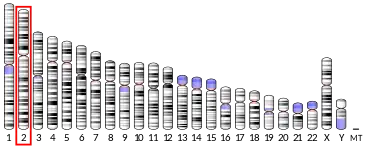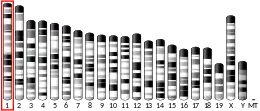PGAP1
Post-GPI attachment to proteins 1 is a protein that in humans is encoded by the PGAP1 gene.[5]
Function
The protein encoded by this gene functions early in the glycosylphosphatidylinositol (GPI) biosynthetic pathway, catalyzing the inositol deacylation of GPI. The encoded protein is required for the production of GPI that can attach to proteins, and this may be an important factor in the transport of GPI-anchored proteins from the endoplasmic reticulum to the Golgi. Defects in this gene are a cause of mental retardation, autosomal recessive 42.
References
- GRCh38: Ensembl release 89: ENSG00000197121 - Ensembl, May 2017
- GRCm38: Ensembl release 89: ENSMUSG00000073678 - Ensembl, May 2017
- "Human PubMed Reference:". National Center for Biotechnology Information, U.S. National Library of Medicine.
- "Mouse PubMed Reference:". National Center for Biotechnology Information, U.S. National Library of Medicine.
- "Entrez Gene: Post-GPI attachment to proteins 1". Retrieved 2016-04-04.
Further reading
- Tanaka S, Maeda Y, Tashima Y, Kinoshita T (2004). "Inositol deacylation of glycosylphosphatidylinositol-anchored proteins is mediated by mammalian PGAP1 and yeast Bst1p". J. Biol. Chem. 279 (14): 14256–63. doi:10.1074/jbc.M313755200. PMID 14734546.
This article incorporates text from the United States National Library of Medicine, which is in the public domain.
This article is issued from Wikipedia. The text is licensed under Creative Commons - Attribution - Sharealike. Additional terms may apply for the media files.



